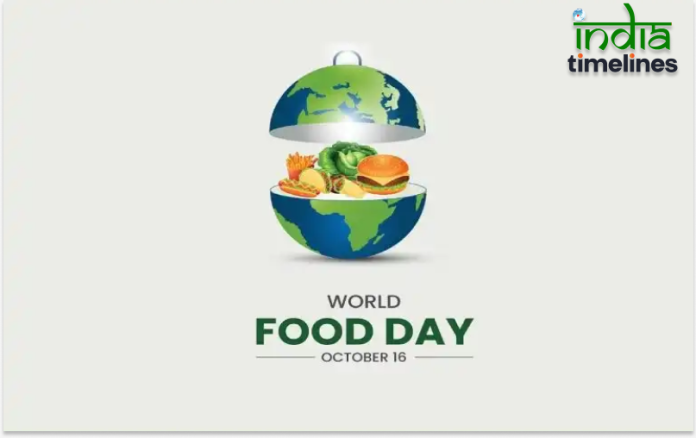
World Food Day, celebrated annually on October 16th, is a reminder of the need to work towards a world where everyone has access to enough nutritious food. Organized by the Food and Agriculture Organization (FAO) of the United Nations, this day draws attention to global hunger and malnutrition, encouraging governments, organizations, and individuals to take action to combat these issues.
In 2024, the theme for World Food Day focuses on building sustainable food systems that can nourish the growing global population while protecting the planet.
The Origins of World Food Day
World Food Day was established in 1979 to mark the founding of the FAO in 1945. Since then, it has grown into a global event celebrated in over 150 countries, with a mission to raise awareness about food security, malnutrition, and the importance of sustainable agriculture. Each year, World Food Day has a different theme, reflecting the challenges faced in the ongoing fight against hunger.
Why World Food Day Matters
World Food Day is crucial because it brings attention to the fact that, despite progress, hunger and malnutrition remain serious issues. According to the FAO, as of 2023, nearly 820 million people worldwide still suffer from chronic hunger. This day is a chance to amplify the call for action, to push for policies and practices that promote food security, and to encourage the global community to commit to ending hunger.
The Theme for World Food Day 2024: “Sustainable Food Systems for All”
The 2024 theme, “Sustainable Food Systems for All,” highlights the need for food systems that are resilient, inclusive, and environmentally friendly. As the global population continues to rise, there is increasing pressure on natural resources. Sustainable practices in farming, food production, and distribution can help ensure that future generations have access to nutritious food while protecting the environment.
The Role of Sustainable Agriculture
Sustainable agriculture is central to addressing global food challenges. By adopting practices that minimize environmental impact, conserve natural resources, and reduce food waste, farmers can produce enough food for the world’s growing population. World Food Day 2024 emphasizes the importance of educating farmers about sustainable techniques, promoting biodiversity, and supporting small-scale producers, especially in developing countries.
Hunger and Malnutrition: A Global Challenge
Hunger and malnutrition are not just issues of food scarcity but also of inequality. Many people lack access to adequate nutrition, even when there is enough food globally. Malnutrition, especially in children, can lead to stunted growth, weakened immune systems, and poor cognitive development. Tackling these issues requires addressing the root causes of poverty, improving access to nutritious food, and ensuring equitable distribution of resources.
The Impact of Climate Change on Food Security
Climate change poses a significant threat to global food security. Changes in weather patterns, such as droughts, floods, and unpredictable growing seasons, directly impact crop yields. World Food Day 2024 highlights the need to adapt agricultural practices to the realities of climate change by investing in resilient crops, improving water management, and reducing greenhouse gas emissions from the agricultural sector.
Food Waste: A Hidden Crisis
One of the major contributors to global hunger is food waste. Shockingly, about one-third of all food produced for human consumption is lost or wasted every year. Reducing food waste at every level of the supply chain, from farms to households, can significantly improve food security. On World Food Day 2024, individuals and organizations are encouraged to reduce food waste by planning meals carefully, using leftovers, and supporting policies that promote efficient food distribution.
The Role of Technology in Solving Hunger
Innovations in technology are helping to revolutionize the way food is grown, distributed, and consumed. From precision farming, which uses data to optimize crop production, to vertical farming in urban environments, technology plays a critical role in creating sustainable food systems. World Food Day 2024 calls for greater investment in these technologies, especially in areas where food insecurity is highest.
Supporting Small-Scale Farmers
Small-scale farmers play a vital role in feeding the world, especially in developing countries. However, they often lack access to resources, technology, and markets, making it difficult to scale up production. World Food Day 2024 focuses on empowering these farmers by providing them with training, financial support, and access to markets, so they can adopt sustainable practices and increase their productivity.
Food Security and Social Justice
Food security is not just about having enough food—it is also about fairness. World Food Day 2024 underscores the importance of addressing the social, economic, and political inequalities that contribute to hunger. This means advocating for policies that protect the rights of small farmers, promote fair trade, and ensure that all people, regardless of their background, have access to nutritious food.
How You Can Take Action on World Food Day 2024
World Food Day is not just about raising awareness—it’s also about taking action. Here are some ways you can contribute:
- Support Sustainable Food Choices: Buy locally grown, seasonal food, reduce meat consumption, and avoid single-use plastics.
- Reduce Food Waste: Plan your meals, use leftovers creatively, and compost organic waste.
- Donate to Food Banks: Many organizations distribute food to those in need. Donating food or money can make a big difference.
- Advocate for Change: Use your voice to support policies that promote food security, sustainability, and equity in the food system.
Global Efforts to Combat Hunger
Organizations like the FAO, the World Food Programme (WFP), and local NGOs play a vital role in fighting hunger on a global scale. These organizations work to provide emergency food assistance, improve agricultural practices, and develop long-term solutions to food insecurity. World Food Day 2024 is a reminder of the importance of supporting these efforts through donations, advocacy, and volunteer work.
Educational Campaigns on World Food Day
Many schools and universities participate in World Food Day by organizing educational campaigns that teach students about hunger, malnutrition, and sustainable agriculture. These campaigns help raise awareness among younger generations, fostering a sense of responsibility towards the planet and the global food system.
The Future of Food Security
As the world continues to face challenges like population growth, climate change, and resource depletion, the future of food security will depend on innovative solutions. By embracing sustainability, investing in new technologies, and supporting global cooperation, we can create a world where everyone has access to enough nutritious food.
Conclusion
World Food Day 2024 is a call to action for governments, organizations, and individuals to work together to build a future where hunger and malnutrition no longer exist. By promoting sustainable food systems, reducing waste, and supporting small-scale farmers, we can make significant progress towards a world where food security is a reality for all.
FAQs About World Food Day 2024
- When is World Food Day celebrated?
World Food Day is celebrated every year on October 16th. - What is the theme for World Food Day 2024?
The theme for 2024 is “Sustainable Food Systems for All,” focusing on the need for resilient and environmentally friendly food systems. - How can individuals contribute to World Food Day?
Individuals can support sustainable food choices, reduce food waste, donate to food banks, and advocate for food security policies. - Why is food waste a major issue?
Food waste contributes to hunger and environmental degradation. Reducing food waste can help improve food security and reduce the strain on natural resources. - What role do small-scale farmers play in food security?
Small-scale farmers are essential in feeding the global population, especially in developing countries. Supporting them through resources and training is key to creating sustainable food systems.


































